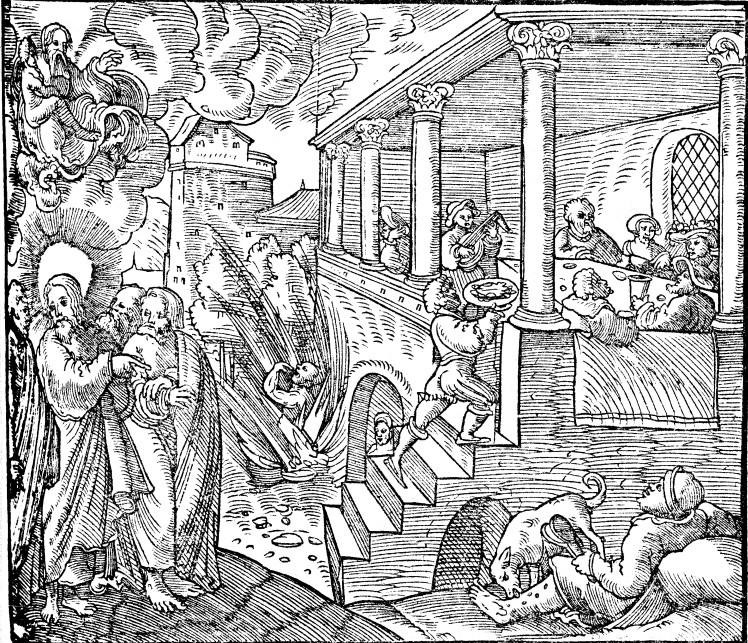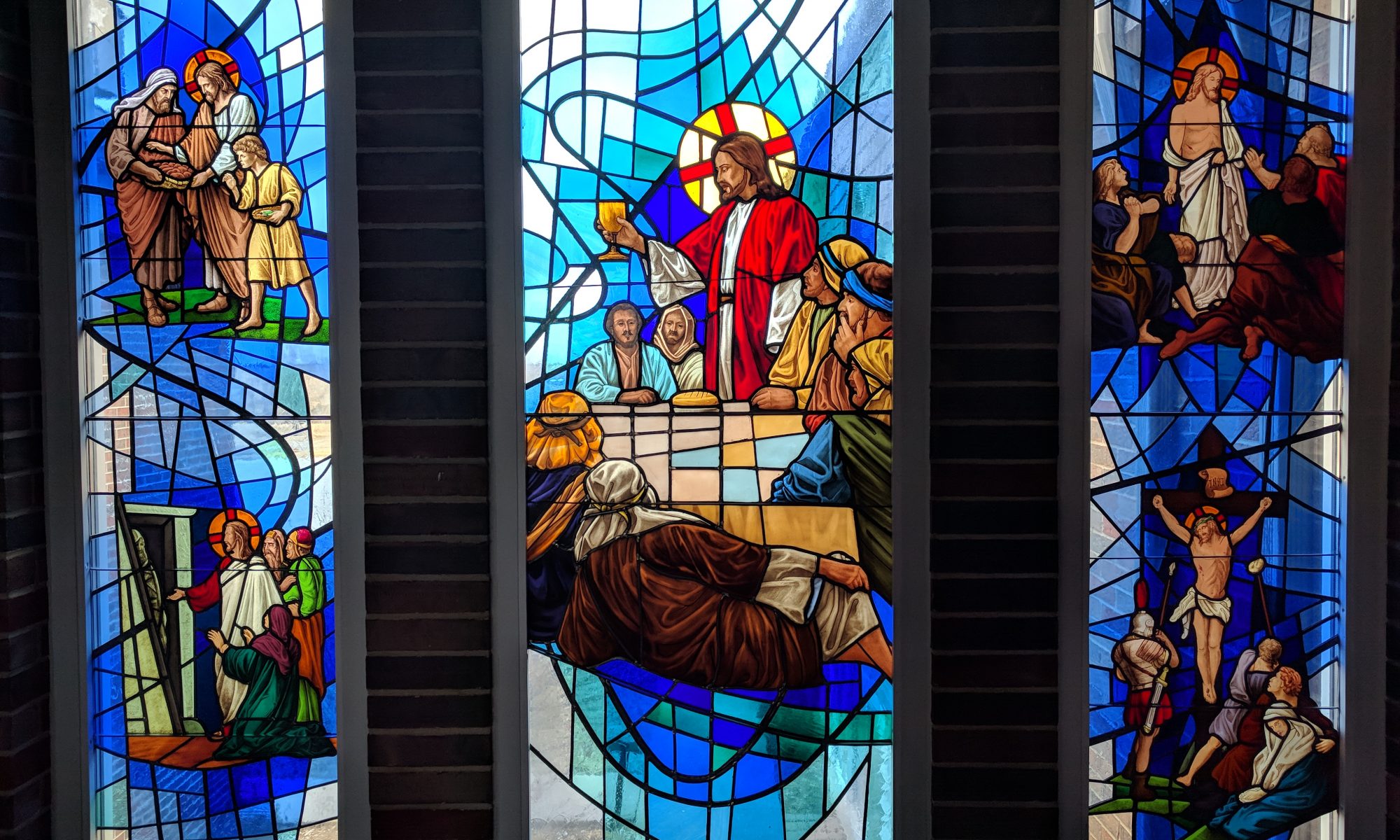
Lessons: Deut. 6:4-15, 1 John 4:18-21, Luke 16:19-31
Hymns: LSB 876, 708, 732, 609, 919
Grace, mercy, and peace to you from God our Father and our Lord and Savior, Jesus Christ. Amen.
Many have viewed our country as a Christian nation. After all, we say “under God” in the Pledge and the words “In God We Trust” are found on our money. Many of our founding fathers were Christian, but common in those days was deism. Deists believe in the existence of a god, but do not believe God is Triune or view the Bible as God’s divine revelation. Some who have studied religious trends in America have asserted that less than 20% belonged to a Christian church in 1776, but that number gradually rose until it peaked in the mid-1900s. Throughout American history, it has been common for not only for cultures to become a melting pot, but also religious views. But combining God’s truth as revealed in the Bible with human or worldly wisdom will always result in false doctrine. We must recognize that true Christianity is distinct from American Christian spirituality. In the same way, our beliefs as Lutherans are distinguished from American spiritualism. Our Christian beliefs are to come from the Bible alone, for it is God’s divine revelation which directs us to our Savior, Jesus.
As Christians, we want our country to be guided by Christian values, morals, and most especially truly Christian beliefs. If we had this guidance, our people would be much more united in politics, far fewer families would be broken, businessmen wouldn’t be at odds with each other as much, and children would be safer on the streets.
Of course, being Christian does not result in utopian living. Strong and devout Christian couples still face challenges within their marriages. Their children still need much training, discipline, and forgiveness. Christians still sin, as Abraham did when he lied saying Sarah was his sister in a feeble attempt to protect himself or David did when he slept with Bathsheba or Jonah did when he tried to get out of preaching repentance to Nineveh.
God establishes churches because we are sinners in need of grace. Without them, we would not bother with the Word of God, and we would simply accept the spiritual trends of the age. Without them, we would not have a way to hear of Christ’s bleeding, dying love. We would have no access to Christian fellowship or Holy Communion.
We want people to know Christ and trust in Him for their salvation. That’s what it means to love our neighbor. Christ loved us and gave Himself up for us. He died to redeem us from sin, death, and the devil. That is love. And so we love, because God in Christ first loved us.
When God commanded the Israelites that they must love the Lord God with all their heart, soul, and might, it was because He first loved them. He was demonstrating His love for them in delivering them and bringing them to the Promised Land. That same love of God is still at work today. He is delivering us from sin and bringing us to the Promised Land of Heaven.
God also commanded the Israelites to teach the Word of God to the next generation. The saving Word was to be central in their lives. Hear again what God said concerning His words, “You shall teach them diligently to your children, and shall talk of them when you sit in your house, and when you walk by the way, and when you lie down, and when you rise” (Deut. 6:7). God still expects us to emphasize, extol, and dwell on His Word just as much today as when He instructed His people back then.
Part of loving our neighbor involves helping the poor. The Rich Man in today’s Gospel did not love Lazarus. He wouldn’t even bother to give him table scraps. The poor man Lazarus did not choose to be poor. He did not find a government that gave for free an endless gravy train so that he could leech off others’ fortunes. Evidently, he was unable to walk and he had sores which the dogs licked. For the most part, his life appeared to be a miserable existence. But he was still loved by God, redeemed by Christ, and belong to God’s family. Because he could not place his trust in the comforts that surrounded him, Lazarus trusted solely in his Savior. Lazarus believed and it was accounted to him as righteousness. And so, when he breathed his last, he was carried to Heaven. His suffering was over.
When we encounter people who have it as poorly as Lazarus did, we are often quick to judge them. We may figure they did some really bad things and so God’s judgment is already upon them. We may figure they have chosen to be lazy and want to live as beggars. Or we may see that they truly have it bad, but we don’t want to get involved. We figure they should have family to look out for them or the government should provide for them.
The problem is, however, that the Bible doesn’t teach that governments should provide for the poor. But the Bible does teach that Christian individuals and Christian churches must care for the poor. American Christians and churches have lost their way in this matter. The government has taken for itself the Church’s responsibility to care for the poor. If we are the Christian nation we say we are, we wouldn’t want the government doing what the Church has often done so well throughout history. Look at all the hospitals and nursing homes that have been started by churches! Many of them are being bought up by corporations, furthering separating the Church from one of her primary tasks. And many Christians are unconcerned about these changes, for they like the idea of not having responsibility, especially for the poor.
The Rich Man took no responsibility for Lazarus. He ate his fancy foods but wouldn’t even give Lazarus beans or bread. Many would look at the Rich Man’s status and conclude he must be loved by God. The circumstantial evidence seemed to be there. But when he died, the Rich Man went to Hell. He received his reward. He trusted in his possessions and luxury in this life and figured he was already good with God. While Jesus paid for his sins on the cross, the Rich Man didn’t receive that forgiveness since he did not live by faith.
After not noticing Lazarus in this life, the Rich Man finally noticed Lazarus in the life to come. He saw him at Abraham’s bosom, comforted, and set free from all the trials of this life. He then makes a stunning request. “Abraham, send Lazarus to dip my tongue in water, for I am tormented in this flame.” Wow. The Rich Man wanted Lazarus to help him now when he wouldn’t help Lazarus at all? Isn’t that a foolishly bold request? Shouldn’t “what comes around goes around” apply here?
Of course not. Remember our Epistle, “If anyone says, ‘I love God,’” and hates his brother, he is a liar; for he who does not love his brother whom he has seen cannot love God whom he has not seen. And this commandment we have from him: whoever loves God must also love his brother” (1 John 4:20-21). And so, in love, we help our neighbors in need. We serve them, even when they are ungrateful. We love our enemies. We do good to those who persecute us. If Lazarus could have gained health and strength in this life while at the same time misery suddenly fell on the Rich Man, it would only have been right for Lazarus to help the Rich Man. Two wrongs don’t make a right. It would have been wrong for Lazarus to coldly say, “Well you didn’t help me, so I won’t help you.” Instead, love demands action.
But after they both died, there was no way for Lazarus to help the Rich Man. As Abraham notes, there is a great gulf fixed which separates Heaven and Hell. There’s no crossing over. Those who die condemned remain condemned.
After showing no mercy to Lazarus, now the Rich Man desires mercy. He is now looking out for his brothers. So, he makes a second request. Because he cannot leave Hell, he wants Lazarus sent back to earth, risen from the dead, to give testimony to the Rich Man’s brothers.
But Abraham responds saying, “They have Moses and the Prophets. Let them listen to the Bible.” This teaches the great power found in the Word of God. After all, God the Holy Spirit is at work, accomplishing what He pleases through His Word. In love, God gave us His Word. Through it, we know who God is and what He has done for our salvation. God the Father sent God the Son to bear our sin in His Body, offer Himself as the ransom payment for our sin, and rise from the grave for our justification. Through Christ, all our sins are cancelled out, even our lack of love.
The Rich Man knows his brothers are happily ignoring the Scriptures. He knows they are spending their lives fretting over trifles and getting things which have no solid ground. And so, the Rich Man makes the case that more is needed to convince his brothers. They need to witness a resurrection! Then they’ll finally repent. But Abraham responds that they won’t repent if they won’t listen to the Word of God, even if they witness a resurrection.
After all, there’s one Resurrection needed for us to know about. Our Lord and Savior Jesus Christ who is crucified has been raised from the dead. He alone gives us hope through His Resurrection. We don’t need others to come back to tell us what Heaven is like in order to believe. We have the Bible, which is exactly the point Abraham was making.
Our hope is not found in religious trends in America. Our hope is not found in what the government can do for us. Our hope is not found in modern luxuries or amenities. But our hope is found in Christ alone. He saves us and grants us the victory. Amen.
The peace of God which passes all understanding keep your hearts and minds in Christ Jesus to life everlasting. Amen

